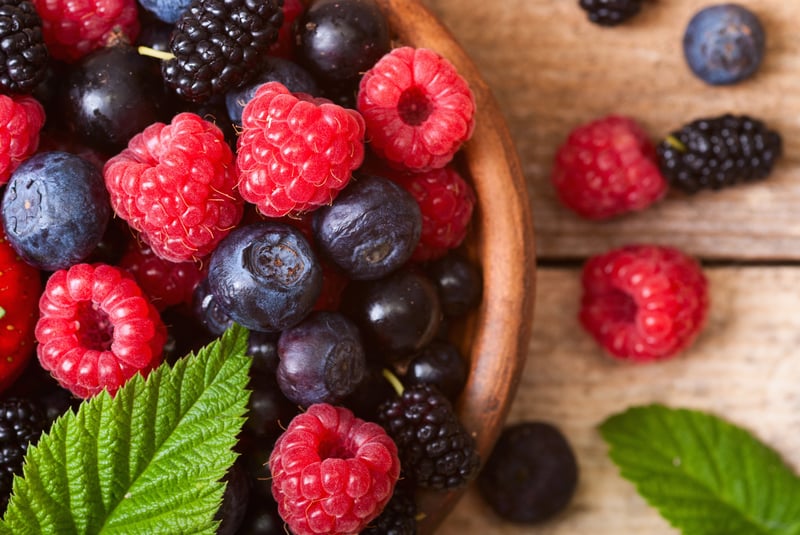Patient Resources
Get Healthy!
Compounds in Chocolate, Berries Might Help Boost Memory As You Age
- May 30, 2023
- Cara Murez
- HealthDay Reporter

You'll likely lose some of your memory and thinking abilities as you age, but nutrients called flavanols might help thwart that decline, a new study suggests.
Not getting enough flavanols -- natural compounds found in fruits, vegetables and even chocolate -- could be driving that age-related memory loss, researchers say.
This research is the pinnacle of 15 years of work showing that flavanols seem to benefit the dentate gyrus, an area within the brain's hippocampus that is critical to memory.
"This is the first time we can conclude that flavanols are acting as a nutrient for the aging brain,"said Dr. Scott Small, a professor of neurology and director of the Alzheimer's Disease Research Center at Columbia University College of Physicians and Surgeons. "We show in this study, because we had biomarkers of flavanols, that if you're relatively deficient in your flavanols, that seems to be driving your age-related memory decline."
This study was funded by the U.S. National Institutes of Health and Mars Edge, a subsidiary of the candy company.
It's possible that just as babies need certain nutrients for their developing brains, the aging brain also requires specific nutrients for optimal health, Small said.
Now that people live longer, scientists are looking into a series of recommendations of nutrients that are beneficial for the aging body and brain, he noted.
"I'd like to believe that this is one of the first studies that is beginning to establish that dietary recommendation,"Small said.
Besides berries and dark chocolate, other flavanol-containing foods include apples -- particularly the peels -- grapes, citrus fruits, cocoa and green tea. Good vegetable sources of flavanols are onions, hot peppers, kale, broccoli, rutabagas and spinach, according to the U.S. Department of Agriculture.
"I believe that you could consume enough flavanols to prevent yourself from being deficient,"Small said.
However, he urged people not to focus on getting this nutrient through chocolate. "There's no way you can eat enough chocolate to have this benefit. In fact, if you tried, you would die first,"Small said.
Prior research in mice found that a particular substance in flavanols called epicatechin enhanced the growth of neurons and blood vessels, improving memory.
In humans, a small study linked the dentate gyrus to cognitive, or mental, aging. A larger trial found that flavanols improved memory, having the greatest impact on people who had a poor-quality diet to start.
To study this further, researchers randomly assigned 3,500 healthy older adults to receive either a placebo or a daily flavanol supplement in pill form. The supplements contained 500 mg of flavanols, including 80 mg of epicatechins (an amount that's recommended you get from food).
Participants answered questions about their diet, and then did web-based activities to assess short-term memory that involved the hippocampus, repeating them after years one, two and three.
More than one-third of participants also supplied urine samples, so that researchers could measure a biomarker for dietary flavanol levels.
No one was severely flavanol-deficient, although those with mild deficiency benefited from flavanol supplements, researchers said.
Researchers also found that memory scores improved just slightly for the entire group taking the supplements, possibly because most already had flavanol-rich diets.
Yet those who reported having a poor diet and who had lower baseline levels of flavanols had memory scores improve by an average of about 11% compared to those on the placebo at the end of the first year. Their memory improved 16% from baseline.
They sustained the one-year improvement for at least two more years.
However, flavanols only improved memory governed by the hippocampus and not other areas of the brain, the researchers noted.
Emma Laing is director of dietetics at the University of Georgia and a national spokesperson for the Academy of Nutrition and Dietetics. She said flavanols are one of several sub-classifications of flavonoids, naturally occurring bioactive compounds linked to human health.
"Consuming foods high in flavanols has been shown in research studies to benefit health and reduce the risk for chronic diseases involving the brain, heart and other organs,"said Laing, who was not involved in this study.
These nutrients give foods like peaches and apples their bright colors, Laing said.
She noted that the role of flavanols on neurological health is an exciting, ongoing area of research with a lot left to learn.
"Intentionally adding flavanol-rich foods to your eating pattern is a relatively simple lifestyle change that you could make to support your health. Many foods naturally contain these compounds, so aiming to add one or more servings of flavanol-rich foods per week would be a realistic place to start,"Laing said.
Lang also recommended eating nutrient-dense foods, getting enough sleep, exercising, staying well-hydrated and avoiding alcohol as ways to reduce the risk of chronic disease and improve overall health.
Because of the study's design, Small said it can't definitively conclude that low dietary intake of flavanols alone causes poor memory, only that there's an association.
The study was published in the journal Proceedings of the National Academy of Sciences.
More information
The U.S. Food and Drug Administration has more on flavanols.
SOURCES: Scott Small, MD, professor, neurology, and director, Alzheimer's Disease Research Center, Columbia University College of Physicians and Surgeons, New York City; Emma Laing, PhD, RDN, national spokesperson, Academy of Nutrition and Dietetics, and director of dietetics, University of Georgia, Athens; Proceedings of the National Academy of Sciences, May 29, 2023

